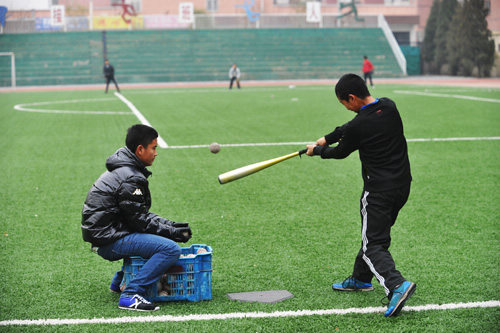|
 |
|
GIVE IT A GO: Kids from Li Wei's baseball club at a training session on November 18 (WEI YAO) |
For more photos please click here
With a cigarette between his fingers, 40-year-old Li Wei crouches among a group of children on a soccer field behind Dacheng School, located outside the West Fourth Ring Road of Beijing. But the children, aged 8 to 14, are not equipped for soccer practice, but for baseball.
Li appears tired, but his words carry fierce energy: "What's on your mind? If you can't play well, get the hell back to the orphanage!" he howls at the youngsters, but the seeming ferocity of his words belies a charitable nature.
Li's methods and manners may be reminiscent of Morris Buttermaker of the 1976 baseball film Bad News Bears, minus the substance abuse. But this is Beijing, not California. Baseball is not China's national pastime, and Li's players are not suburban brats. They are considerably worse-off than the Bears.
Of more than 40 children on the team, over 10 were selected by Li from orphanages and poor families all over the country.
"I have to trigger their fighting spirit so that they can learn how to compete like wolves in both the field and harsh society," said Li, who believes acquiring baseball skills will help less fortunate children succeed in life.
Li lives with his pack of wolf cubs in an old gray low-rise dormitory behind the school. Rusty staircase railings have stained the exterior wall yellow.
"We have to take every small expense into account," said Li, who has put 700,000 yuan ($112,352) from his own pocket into a fund for the club. Li even hired a cook because food at the school canteen is too expensive for some of his players.
"It is much more difficult than I thought, but I won't give up," Li said.
At all costs
Li's baseball career began at a primary school in Beijing's Fengtai District. "The team provided free sneakers, which was the only motivation for me to join," he said. In the 1980s when the country was just beginning its economic ascent, a free pair of sneakers was a major incentive for athletic participation.
With much hard work and sweat, Li earned a place on the National Junior Baseball Team, but was eventually dismissed for fighting with teammates.
Li then became a peddler of clothes, fruits and vegetables. "I almost tried every possible way to make money," said Li, who went to the United States in the late 1990s, where he started a small business and worked a series of odd jobs.
Li's American dream ended when he awoke one day with baseball fever. "The memory of playing baseball with teammates killed my business life. Those carefree and happy days were always on my mind and in my dreams until one day. I decided to form my own club," said Li, who then came back to China after a four-year stint in America and founded the Xinxing Longren Baseball Club.
In June 2004, Li went to Hohhot, capital of north China's Inner Mongolia Autonomous Region, to recruit children for his club. Eleven-year-old Yang Yanyong caught his attention. Yang had a major advantage in that he ran much faster than his peers.
When Li asked Yang how tall his parents were, trying to estimate how tall he might grow, the boy just hung his head. He didn't know. Yang is an orphan and had started lessons at the school just a few days before Li arrived.
Li brought 14 children to Beijing for training camp. In the end, Yang and two others decided to stay and join Li's club.
The three children from Inner Mongolia, together with six others recruited from elsewhere in China, formed the Xinxing Longren club's first team.
Like his mentor, Yang's initial reason for playing was not a pure love of the sport, but tragic necessity. "He ran away at least three times because he couldn't get used to life here and couldn't bear my strict training methods, but he came back every time for food," Li said. "If a pair of free sneakers was my reason for playing this sport, Yang's reason is to have enough food to eat."
| 